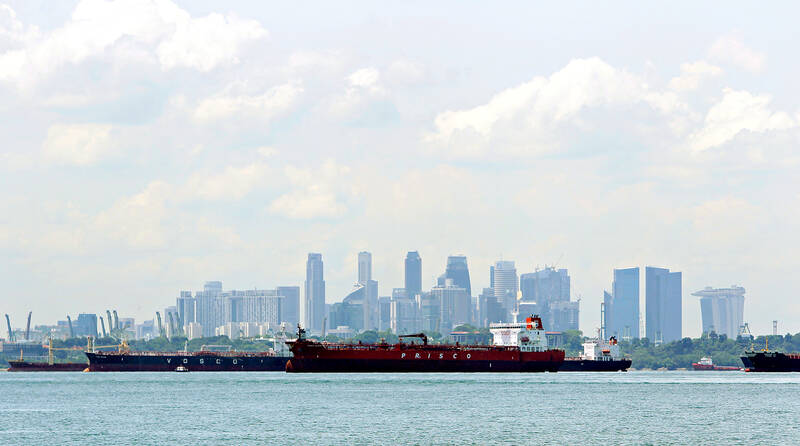Demand is soaring for oil storage tanks in Singapore, a sign that a flood of Russian fuel is being blended and re-exported globally.
Tank space in the city-state is being snapped up due to a rise in interest and profits from mixing cheap fuel supplies from Russia with shipments from other sources, an executive from a tank operator and a consultant who advises traders on the matter said.
That process can help obscure the cargo’s origins, they said.

Photo: Reuters
Singapore has not banned the importation of Russian oil or petroleum products, although financial institutions based in the city-state are prohibited from financing or dealing with Russian goods and companies.
Singaporean government agencies referred to past statements on the ban and price cap policy, without additional comments.
Still, the handling and trading of Russian fuel remain a sensitive issue in the region, with some buyers not wanting to be seen purchasing the cargo.
Russian crude oil and fuel flows to Asia and the Middle East have surged since Moscow’s war in Ukraine prompted Western buyers to turn away in retaliation.
Such shipments have increasingly made their way to blending and redistribution hubs like Singapore and Fujairah in the United Arab Emirates, where they can be co-mingled, repackaged and re-exported globally.
This trend of more Russia-to-Asia shipments and the growing role of hubs in their redistribution might further intensify in the coming weeks, as Europe prepares to roll out new sanctions on Russian petroleum products on Feb. 5.
Oil market participants are keenly watching to see where Russian fuels such as gasoline, naphtha and fuel oil will find homes as many Asian nations are not taking a hard stance on sanctions.
“We have observed an increase in the number of inquiries of short-term storage in the period leading up to December,” a spokesperson for oil storage firm Advario Asia Pacific Pte said via e-mail.
The company verifies the source of products to ensure compliance with Russian sanctions before accepting them, the person added.
A spokesperson for Singapore-based Jurong Port Universal Terminal Pte declined to comment on specific product movements, but said the company complies with all applicable sanctions.
Among other storage firms, Horizon Singapore Terminals Pte did not respond to Bloomberg queries, while a spokesperson for Royal Vopak NV declined to comment.
Advario, Jurong Port, Horizon and Royal Vopak operate commercial tanks in Singapore. A six-month lease for Singapore fuel oil or crude oil storage rose by as much as 20 percent in costs over the course of last year, said executives from tank operator firms.
Ship tracking data by Vortexa Ltd showed that Singapore oil-receiving terminals took in more than double the volume of Russian naphtha and fuel oil last month as compared to a year ago.
Singapore received 2.6 million barrels of naphtha, nearly 40 times the volume taken a year earlier.

TAKING STOCK: A Taiwanese cookware firm in Vietnam urged customers to assess inventory or place orders early so shipments can reach the US while tariffs are paused Taiwanese businesses in Vietnam are exploring alternatives after the White House imposed a 46 percent import duty on Vietnamese goods, following US President Donald Trump’s announcement of “reciprocal” tariffs on the US’ trading partners. Lo Shih-liang (羅世良), chairman of Brico Industry Co (裕茂工業), a Taiwanese company that manufactures cast iron cookware and stove components in Vietnam, said that more than 40 percent of his business was tied to the US market, describing the constant US policy shifts as an emotional roller coaster. “I work during the day and stay up all night watching the news. I’ve been following US news until 3am

UNCERTAINTY: Innolux activated a stringent supply chain management mechanism, as it did during the COVID-19 pandemic, to ensure optimal inventory levels for customers Flat-panel display makers AUO Corp (友達) and Innolux Corp (群創) yesterday said that about 12 to 20 percent of their display business is at risk of potential US tariffs and that they would relocate production or shipment destinations to mitigate the levies’ effects. US tariffs would have a direct impact of US$200 million on AUO’s revenue, company chairman Paul Peng (彭雙浪) told reporters on the sidelines of the Touch Taiwan trade show in Taipei yesterday. That would make up about 12 percent of the company’s overall revenue. To cope with the tariff uncertainty, AUO plans to allocate its production to manufacturing facilities in

Six years ago, LVMH’s billionaire CEO Bernard Arnault and US President Donald Trump cut the blue ribbon on a factory in rural Texas that would make designer handbags for Louis Vuitton, one of the world’s best-known luxury brands. However, since the high-profile opening, the factory has faced a host of problems limiting production, 11 former Louis Vuitton employees said. The site has consistently ranked among the worst-performing for Louis Vuitton globally, “significantly” underperforming other facilities, said three former Louis Vuitton workers and a senior industry source, who cited internal rankings shared with staff. The plant’s problems — which have not

COLLABORATION: Given Taiwan’s key position in global supply chains, the US firm is discussing strategies with local partners and clients to deal with global uncertainties Advanced Micro Devices Inc (AMD) yesterday said it is meeting with local ecosystem partners, including Taiwan Semiconductor Manufacturing Co (TSMC, 台積電), to discuss strategies, including long-term manufacturing, to navigate uncertainties such as US tariffs, as Taiwan occupies an important position in global supply chains. AMD chief executive officer Lisa Su (蘇姿丰) told reporters that Taiwan is an important part of the chip designer’s ecosystem and she is discussing with partners and customers in Taiwan to forge strong collaborations on different areas during this critical period. AMD has just become the first artificial-intelligence (AI) server chip customer of TSMC to utilize its advanced